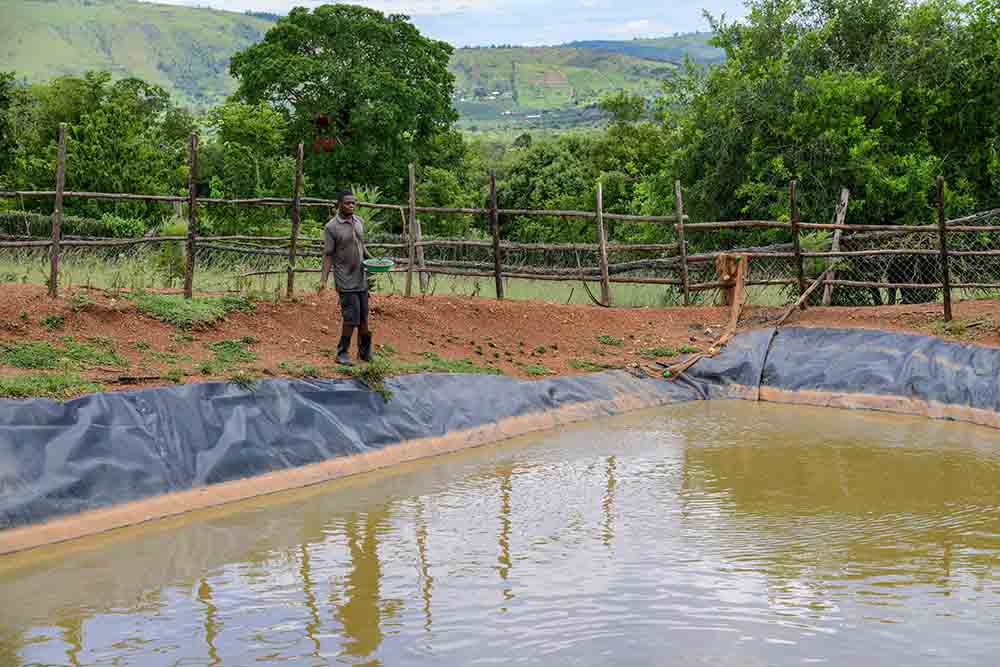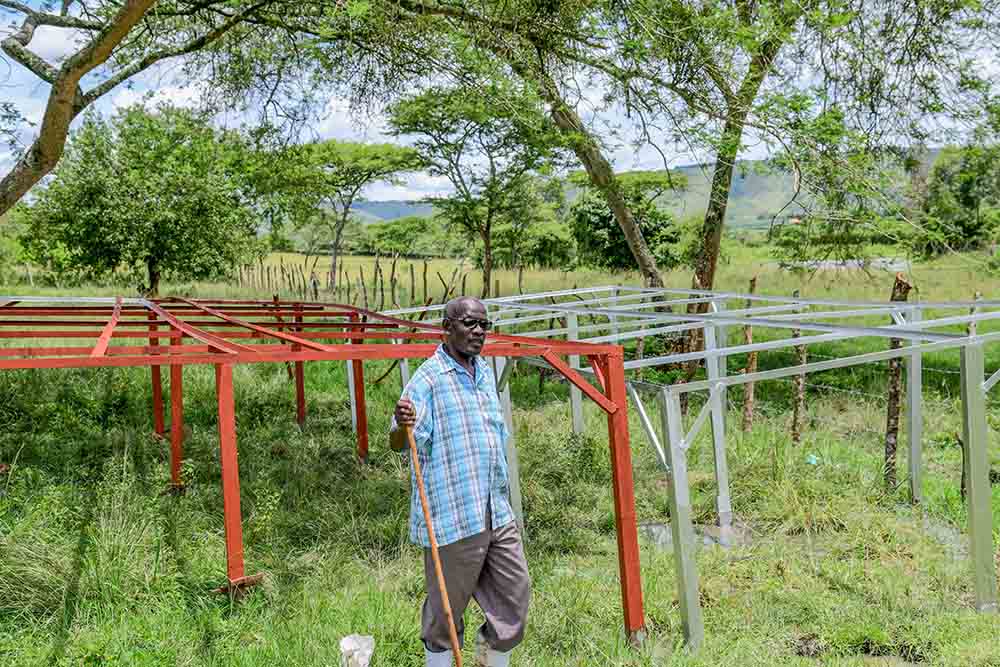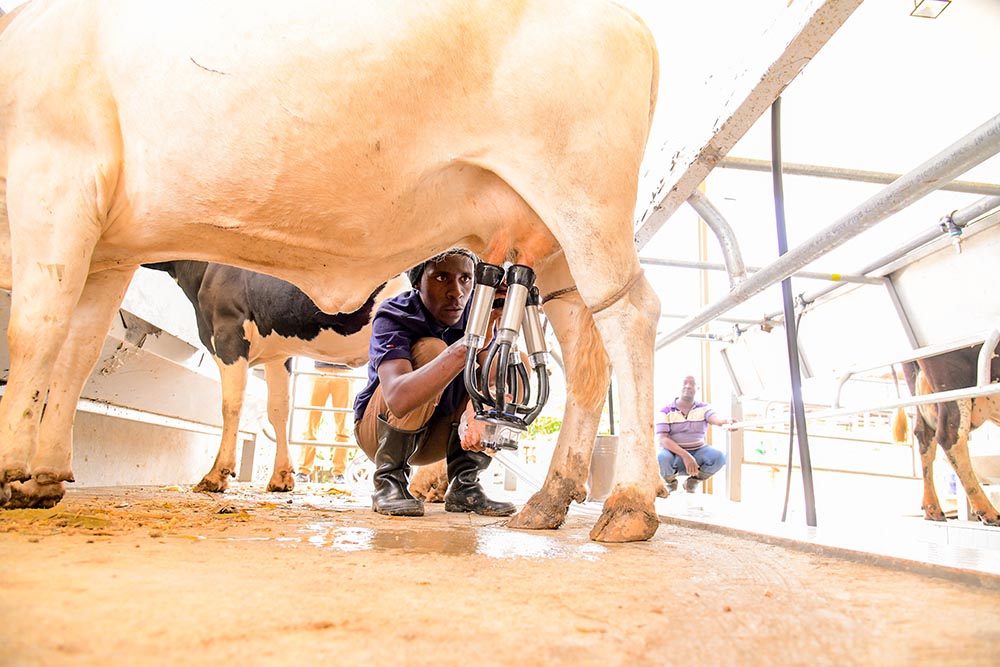By Herbert Musoke
aBi-development has supported many farmers countrywide achieve better yields and earnings. aBi’s focus is to increase agricultural production and value addition by extending matching grants and business development services to agribusinesses, farmer organisations and intermediaries to enhance planning and management. They also support production and business infrastructure, as well as upstream and downstream market linkages of producers and agribusinesses. In a 10-part series, Harvest Money shall carry stories focusing on the success of aBi activities countrywide. In the second story, Herbert Musoke looks at how farmers in Rwenjeru, Mbarara solved water for production challenges

If you visited Rwenjeru United Traders Farmers in Mbarara city during the rainy season, you would be fascinated by the beautiful scenery chracterised by the green and flowing water.
But listening to the farmers in, it is a different story all together during the dry season as the area dries out leaving no gras nor water to feed the animals.
“For the all the past years, we have been losing our animals because the pastures and all water sources dry out leaving us with nothing to feed on our animals. We dug four dams but because they are seasonal and serve the whole sub-county of Rwenjeru parish it couldn’t sustain all farmers and people throughout the dry period,” explains Duncan Aturinda the operations manager.
He narrates that they are on the leeward side of the region as they would see rain in the nearby areas for over 4-6 months especially from May to October with rains in their area.
The search for water
The farm is situated along the cattle corridor that stretches from the South western to the northern east Uganda in that districts of: Kotido, Nakapripirit, Kabong, Kiboga, Moroto, Kiruhura, Rakai, Isingiro, Lyantonde, Mbarara, Ntungamo and Soroti among others. It is characterized by livestock producers scarce water and pastures.
Although it is vulnerable to climate change, it remains relavant to national and local food security. With scch characteristics, water has been a long standing in the area.
however, this challenge was resolved courtesy of the aBi Green Challenge. aBi gave the association a grant worth shs350m early this year which was channelled into the setting up of two boreholes and constructing two tanks with a capacity of 100,00 litres each. The tanks have been set up on two hills.
Aturinda says they already had one 100,000ltr tank that has been boosted by the two others planned, ensuring sufficient and sustainable water for not only to the farm, but also to the community.
“There are over 300 households in the community, who are freely benefiting directly from this water for both home use and farming,” Aturinda adds.
He adds that, using the funds from aBi, they have also dug an underground well with capacity of 9,000 litres per an hour. This water is driven to the tanks uphill with the aid of a solar-powered pump. The water is then circulated around the farm using gravity through pipes.
He explains that this water was tested and proved sufficient as well as clean and safe for both human consumption and agricultural use.
“We have set up community water committees that are responsible for all issues concerning water rights from vetting people for connection, monitoring of the pipelines for illegal connections and leakages and any other issues,” he says.
According to the arrangement, this water is free but only for home and agricultural use.
“If one is caught selling this water, one is disconnected immediately because we are also giving this water for free. Therefore, if any one wants water, they should get it for free,” says Aturinda.

The green challenge by aBi
The Green Challenge Fund (GCF) was developed to address the increasing impacts of climate change on Uganda’s agri-food system. The process started in July 2022, and winners were announced in November 2022 and the projects are to be implemented between November 2022 and March 2024.
The Funding was open to private sector agribusinesses, Non Government Organisations, scientists, researchers and start-ups.
Applicant proposals had to be directly or indirectly lead to increased economic activity and productivity in the aBi seven (7) priority value chains Coffee, cereals, poultry, dairy, horticulture, pulses and oilseeds.
This is through the increase of small and medium sized enterprises and farmer resilience to climate change or reduce green house gases/enhance carbon sinks and reservoirs or contribution to environmental conservation.
Eligibility criteria for applicants; Growth stage – aBi existing and Past
Implementing Partners as well as new entities seeking to green their investments (Budget allocation of sh5b; average project size up to sh500m)
Applications had to be addressing one or more of the following: climate change adaptation, mitigation or protection of environment and biodiversity in one or more aBi seven (7) priority value chains above; or with green innovations that can add value to the said value chains.
Applications also had to directly or indirectly lead to increased economic benefits and productivity.
Applications had to demonstrate the ability to be scaled up for adoption on a large scale to benefit the agribusiness sector.
Applicants had to be legally registered institutions and in existence for at least 3 years, supported with audited financials.
Applicant had to be a reputable organisations.
Rwenjeru United Traders Company
Martin Kananura, the director of company, explains that this farm was started by his parents in Bushenyi who were growing matooke.
“The farm was started by my parents and I would often come to help them as I was a head teacher and grew to love farming more. As they grew older, they could no longer manage the farm. When I retired in 2019, the farm became my full-time job,” he says.
The land in Bushenyi became insufficient to cater for the animals, he says, thus relocating to Rwenjeru, Biharwe-Mbarara City where they now keep dairy and beef cattle, goats, sheep as well as growing matooke and pasture.
He explains that before retiring, he took close supervision of the farm, especially during the days of spraying to ensure the health of the animals.
“At the time we established this farm here, we had about 40 acres and went on buying more land and now have 200 acres. I upgraded the farm changing how things are done from the way my parents used to do because things have now changed and we can’t continue running farming as our parents in this modern age,” he says.
Aturinda says they have introduced smart agricultural practices, which has turned the farm into a learning centre for many farmers in the region. The farmers are taught best modern practices in the areas of their interest. In addition, students from higher institutions of learning do their internships from there.
Modern farming practices
To improve the returns from the dairy section, a modern milking parlour with a new machine from the incomes and saving of the farm and has been set up on the farm.
“We have just finished this milking parlour and are making our cows get used to the machines as they were used to hand milking with their calves but with machines, calves are not met to suck directly from their mothers but rather fed on bottles.
According to Aturinda, these machines have increased efficiency in milking and quality of milk as it is free from contaminations. For example, it takes an average of three minutes for a machine to milk a cow which would be about ten plus for a worker and because of the long time, it becomes tiresome to to worker and painful to the animals thereby reducing the among to be milked.
Secondly, the farm has an automated system for filling the troughs so the cows get enough water. “Previously our cows used to get insufficient water as the workers would give them little water. This did not only affect their production but also their health,” Aturinda says.

Cattle
Kananura explains that because they are in harsh climatic dry conditions, they have chosen cross breeds of friesians and local Ankole cows for dairy cows. For the beef cattle, the borans crossed with the local Ankole cows for beef which are resilient to such conditions.
“Because we have been experiencing harsh conditions, our average milk production is still so low that we milk about five litres per cow which is still very low. We are now milking about 40 cows and getting 200ltrs a day,” he says.
This wasn’t only for the Rwenjeru farm, but for all farmers along the cattle corridor of Mbarara as Innocent Atwine, a farmer at Rwenjeru South, who rears cattle and grows matooke, says he used to keep local cows whose milk productivity was low, especially during the dry season.
He says he used to take the cattle to a valley dam over 3km away, a distance only local animals could manage as they are stronger than exotic breeds.
“I couldn’t risk keeping improved animals that can’t thrive in the harsh hot and dry seasons that we experience here. But now that we have gotten water to give our animals and also irrigate pasture, I am planning to scale down the local animals and stock high milk producers which seem profitable,” he says.
He also had small land but during the training by aBi, he learnt how to maximise production on a small piece of land and for that he has planted pastures.
Pastures
In addition to the grant, aBi has continuously conducted training sessions for farmers in the best and modern practices including improving breeds and feeding especially growing pastures for fodder.
“We have been trained that cows need not only to be satisfied, but also be fed on nutritious pastures. Here we are trained on growing pastures and the different varieties. We now have seven varieties of pastures including maize, sorghum and Chloris Gayana, among others on 10 acres,” says Aturinda.
He says they now have hay barns and silage banks which will enable them to survive the dry seasons with feeds that are also nitrous.
Market
To ensure a reliable market for the farm products, Kananura says, the formed cooperative societies through which they sell as a group, thus commanding higher prices. Their milk goes for shs1,500 per litre.
“We have two groups; Abesigana Dairy Cooperative Society for dairy farmers and Kyarujungu Meat Producers’ Cooperative Society for beef farmers. These cooperatives have also brought us together as farmers to not only market together, but also ensure quality,” he explains.
Plans
When Mbarara attained city status, Aturinda says, they thought of venturing into agro-tourism as they have land with beautiful sceneries including the two hills, rocks, apiary, the animals, fish, birds, insects like butterflies, among others.
He explains that the business has already been registered but now plans for building cottages for visitors as many would like to visit and stay for some days especially families that would have their children spend their holidays on farms to learn and even those who wish to just have a day out of the busy city.
One of the plans is to increase production through improving the breeds of the animals they rear to at least 10 litres a day because they now have the capacity to feed them, Kananura explains.
“We want to do value addition because with increased production among members, supply will be higher than the demand which will create a surplus resulting in a fall in the prices. Therefore, adding value to our milk will be the answer to our milk where we will produce pasteurised milk, yoghurt and cheese, among others,” he says.
About aBi
The Agriculture Business Initiative (aBi Development Ltd), was jointly founded by the Government of Denmark and Uganda in 2010. Its focus is to increase agricultural production and value addition by extending matching grant and Business Development services to agribusinesses, farmer organizations and intermediaries to enhance planning and management, production and business infrastructure, as well as upstream and downstream market linkages of producers and agribusiness. In order to achieve the following results; increase smallholder farmer’s sustainable production, productivity and marketing integration; sustainable enhanced.





